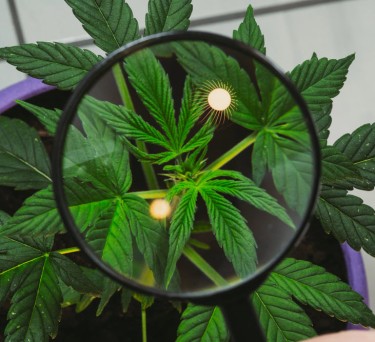
Imagine walking into a dispensary in 2030 and ordering a strain specifically designed for your unique genetic makeup, medical history, and desired effects. Not just "something for sleep" or "pain relief," but a cannabis variety literally engineered at the molecular level to interact perfectly with your individual endocannabinoid system. Science fiction? Not anymore.
Canadian researchers at Université Laval have just cracked the code that could transform cannabis from a one-size-fits-all plant into precision medicine. Their groundbreaking study, published in The Plant Genome, identified 33 genetic markers that significantly influence cannabinoid production in cannabis plants. This isn't just another incremental advance in cultivation—it's the blueprint for completely reimagining how we breed, grow, and consume cannabis.
The implications are staggering. Instead of hoping that "Purple Kush" might help your insomnia or that "Sour Diesel" could boost your creativity, future cannabis consumers could access strains designed specifically for their neurochemistry, medical conditions, and therapeutic goals. We're talking about the cannabinoid equivalent of personalized medicine, where your cannabis is as unique as your fingerprint.
But this genomic revolution represents more than just better weed—it's validation of everything prohibition opponents have argued for decades. While politicians spent fifty years claiming cannabis had "no medical value," scientists have been quietly mapping one of nature's most sophisticated pharmaceutical factories. The plant that governments insisted was too dangerous to study is revealing itself to be one of the most medically promising organisms on Earth.
As we stand on the brink of the designer cannabis era, the question isn't whether this technology will transform medicine and recreation—it's whether prohibition-minded politicians will try to stop it from reaching the people who need it most.
The Genetic Breakthrough: Mapping Cannabis's Molecular Secrets
The Canadian research team accomplished something that seemed impossible just a decade ago: they created a comprehensive genetic map showing exactly which parts of the cannabis genome control cannabinoid production. Using "high-density genotyping" techniques, they analyzed thousands of molecular markers across 174 different cannabis specimens, each with known levels of various cannabinoids like THCA, CBDA, and CBN.
What they discovered was remarkable. Thirty-three specific genetic markers emerged as "significantly influencing cannabinoid production," with what researchers called "high impact on the phenotype." In simpler terms, they identified the molecular switches that determine whether a cannabis plant produces THC, CBD, or any of the hundred-plus other cannabinoids we're just beginning to understand.
Perhaps most exciting was their discovery of what they termed a "massive" gene complex on one chromosome spanning about 60 megabases—a huge section of genetic material specifically associated with THC-dominant cannabis strains. This finding suggests that THC production isn't controlled by a single gene but by a sophisticated genetic network that could be precisely manipulated through breeding.
Dr. Martin Jutras, one of the study's authors, explained the significance: "These molecular markers will be highly valuable in breeding programs aiming to create new Cannabis variety with enhanced and specific cannabinoid profiles tailored for medical and recreational uses." Translation: breeders can now design cannabis plants with the precision of pharmaceutical chemists.
The research represents a fundamental shift from traditional cannabis breeding, which relied on phenotypic selection—basically choosing parent plants based on how they looked, smelled, or affected users. This new approach allows breeders to make selections based on genetic markers before plants even flower, dramatically accelerating the breeding process while ensuring desired traits.
The study's authors noted that decades of prohibition "have impeded the establishment of genetic resource collections and the development of advanced breeding practices, thus limiting both the genetic improvement and the understanding of Cannabis traits." In other words, we're finally catching up on research that should have been happening for the past fifty years.
But the Canadian study isn't happening in isolation. Just months earlier, South Korean researchers announced the discovery of cannabielsoxa, a completely new cannabinoid with potential anti-cancer properties. Meanwhile, American Chemical Society research has identified "previously undiscovered cannabis compounds" that challenge our understanding of how terpenes and cannabinoids create the plant's effects.
These rapid-fire discoveries suggest we're in the early stages of a cannabis genomic revolution. Each new cannabinoid, each mapped genetic pathway, each understood molecular interaction brings us closer to unlocking the plant's full therapeutic potential.
Medical Applications: Precision Cannabis Medicine
The medical implications of designer cannabis strains are nothing short of revolutionary. Instead of the current trial-and-error approach where patients experiment with different products hoping to find relief, genetic markers could enable doctors to prescribe cannabis strains optimized for specific conditions and individual genetic profiles.
Consider epilepsy treatment, where Charlotte's Web and other CBD-rich strains have already transformed pediatric care. With precise genetic markers, breeders could develop strains with exactly the right CBD-to-THC ratios, specific minor cannabinoid profiles, and complementary terpene compositions for different types of seizure disorders. A child with Dravet syndrome could receive a genetically distinct strain from someone with Lennox-Gastaut syndrome, each optimized for maximum therapeutic benefit.
Pain management represents another frontier for precision cannabis medicine. Chronic pain involves complex interactions between inflammation, nerve sensitization, and psychological factors. Future cannabis strains could be designed to target specific pain pathways: high-CBG varieties for neuropathic pain, balanced CBD/THC formulations for inflammatory conditions, or novel cannabinoid combinations for fibromyalgia or cancer-related pain.
Mental health applications could be equally transformative. Current research suggests different cannabinoid ratios affect anxiety, depression, and PTSD differently. Genetic markers could enable development of strains optimized for specific neurotransmitter systems: varieties targeting serotonin pathways for depression, GABA-focused strains for anxiety, or dopamine-modulating cannabis for ADHD.
Cancer treatment presents perhaps the most promising application. As researchers discovered with cannabielsoxa's anti-cancer properties, different cannabinoids may target different cancer types. Genetic markers could facilitate development of strain libraries specifically designed for various cancers: lung, breast, prostate, brain tumors, and blood cancers could each have optimized cannabinoid profiles.
The personalization potential extends beyond conditions to individual genetic variations. People metabolize cannabinoids differently based on genetic polymorphisms in enzymes like CYP2C9 and CYP3A4. Future genetic testing could determine optimal cannabis chemotypes for individual patients, considering both their medical conditions and their unique metabolism.
Elderly patients could benefit from strains designed to minimize cognitive side effects while maximizing pain relief and appetite stimulation. Pediatric patients could access ultra-low-THC varieties with enhanced CBD and minor cannabinoid profiles for various childhood conditions. Veterans with PTSD could receive strains specifically designed to modulate stress response systems without impairing daily function.
The speed of development will be unprecedented. Traditional pharmaceutical development takes 10-15 years and costs billions. Cannabis breeding with genetic markers could produce new medical varieties in 2-3 years at a fraction of the cost. This acceleration means patients won't wait decades for relief—they'll have access to optimized treatments within years of genetic discoveries.
Recreational Revolution: Customized Cannabis Experiences
While medical applications capture headlines, the recreational implications of designer cannabis are equally revolutionary. Imagine ordering cannabis strains designed for specific activities, moods, or social situations with the precision of selecting wine varietals for different meals.
Creative professionals could access strains optimized for divergent thinking and artistic expression. Athletes could use varieties designed for focus and pain management during training, then switch to recovery-focused strains afterward. Social users could choose formulations that enhance conversation and empathy without anxiety or paranoia.
The genetic markers identified by Canadian researchers suggest we could design strains for specific temporal experiences. Want a two-hour creative boost? There could be a strain for that. Need eight hours of sleep support? Genetic markers could enable breeding for specific onset times, duration, and effects profiles.
Micro-dosing enthusiasts could benefit from strains with ultra-controlled potency levels and predictable effects. Rather than cutting gummies into tiny pieces or diluting tinctures, consumers could access varieties naturally producing precisely the cannabinoid levels they prefer.
Social cannabis could become as sophisticated as craft cocktails. Strains designed for parties might enhance sociability and laughter while minimizing sedation. Date night varieties could focus on mood enhancement and sensory amplification. Professional networking strains could provide mild euphoria and increased chattiness without impairment.
The terpene-cannabinoid interactions revealed by genetic mapping could create entirely new flavor and effect profiles. Rather than just fruity or earthy strains, consumers could choose varieties designed to evoke specific sensory experiences: ocean breezes, mountain forests, tropical beaches, or urban gardens.
Seasonal strains could be optimized for different times of year. Summer varieties might focus on energy and outdoor activities, while winter strains could emphasize cozy relaxation and mood support during darker months. Holiday-specific varieties could enhance celebration moods or family gathering stress relief.
The Sticky Bottom Line
The identification of 33 genetic markers for cannabinoid production represents more than a scientific breakthrough—it's proof that cannabis prohibition has always been based on ignorance rather than evidence. While politicians spent decades claiming this plant had no medical value, scientists have been quietly discovering one of nature's most sophisticated medicine factories.
Designer cannabis strains aren't just coming—they're inevitable. The genetic tools now exist to create varieties optimized for specific medical conditions, individual genetic profiles, and precise recreational experiences. We're entering an era where cannabis will be as personalized as any other medicine, designed at the molecular level to serve human needs with unprecedented precision.
But this revolution faces the same obstacle that has hindered cannabis research for decades: political prohibition that serves pharmaceutical interests rather than public health. As the leaked memo about Trump administration priorities suggests, even basic cannabis research could face renewed restrictions despite overwhelming scientific and public support.
The race is on between scientific progress and political obstruction. Canadian researchers have handed humanity the keys to unlocking cannabis's full potential, but whether Americans can access these benefits depends on whether we elect leaders who prioritize evidence over ideology.
The genetic markers identified by Université Laval researchers will constitute "an essential tool in breeding programs" that "promise to accelerate the selection process for promising accessions" while "significantly reducing costs associated with labor-intensive phenotype-based selection methods." In other words, better medicine at lower costs with faster development times.
This technology could democratize cannabis medicine in ways that threaten pharmaceutical monopolies. When patients can access precisely designed plant medicines for a fraction of prescription drug costs, the entire healthcare paradigm shifts. The economic implications explain why prohibition persists despite overwhelming evidence of cannabis safety and efficacy.
Cannabis advocates must recognize that genetic breakthroughs like this one represent our strongest arguments for full legalization. The plant that governments claim is too dangerous to study is revealing therapeutic potential that could revolutionize medicine. Every delayed genetic discovery represents suffering that could have been prevented.
The future of cannabis isn't just legal access—it's personalized medicine designed at the genetic level to serve individual needs. Designer strains could transform how we treat pain, epilepsy, cancer, mental health conditions, and countless other medical challenges. They could create recreational experiences as sophisticated as fine wine or craft spirits.
But accessing this future requires political leaders who understand that cannabis prohibition is a relic of ignorance that has delayed medical breakthroughs for decades. The genetic markers have been identified. The breeding techniques exist. The only remaining obstacle is the political will to let science serve humanity rather than corporate interests.
The designer cannabis era begins now. Whether Americans can participate depends on whether we demand representatives who prioritize scientific progress over prohibition politics. The choice is ours, and the stakes couldn't be higher.






